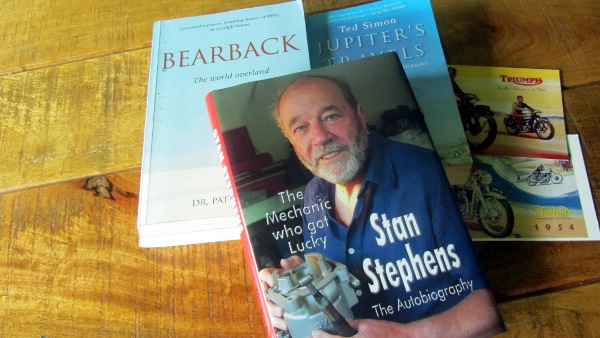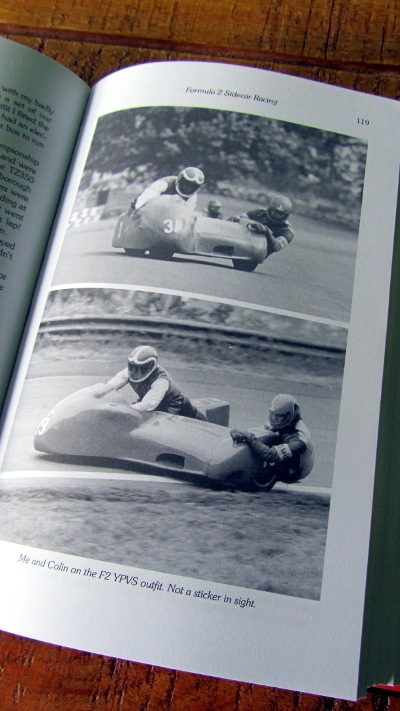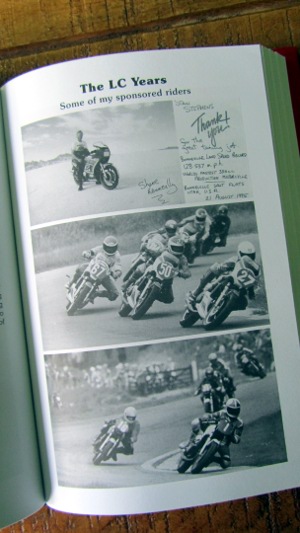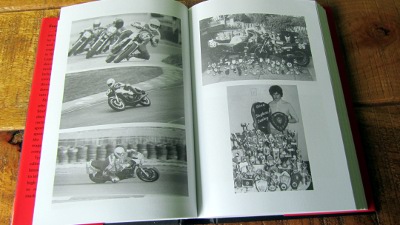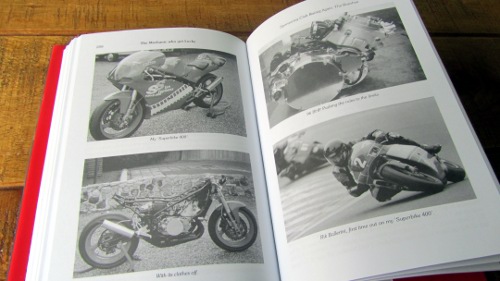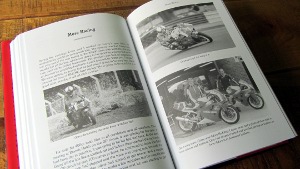'The Mechanic Who Got Lucky' - motorcycle book review
The autobiography of Stan Stephens
John Newman
The epithet 'legend' is thrown at almost anyone these days. It is often a result of lazy thinking by the writer, or just a case of following the hype, but few people truly deserve the accolade, if that is what it is..
There is one person in the motorcycling world, who many may never have heard of, who should be tagged with the 'legend' label because of what he has achieved in racing, engine development, sponsorship and outright enthusiasm for our two wheel sport.
Gritty and spirited
Stan Stephens has been a gritty and spirited sidecar racer – is there any other kind? He was an innovative engine tuner, top mechanic, sprinter, dealer, sponsor of dozens of riders across road racing, moto cross, trials, grass track, and parent to two motorcycle enthusiast sons and partner of Julie who has worked alongside him and supported all his sometimes outlandish endeavours.
He was a man of his time when affordable production racing was at its zenith, and a series of very rapid Suzuki and Yamaha two stroke bikes were let loose on the road and track: the late sixties and seventies. He was one of a handful of tuners in the country who was able to dramatically enhance their performance, and when these models were no longer available, he turned his attention to making four strokes perform just as well.
Buck the negatives and carry on
He has now set out all his experiences and chronicled his life in a book entitled 'The Mechanic Who Got Lucky'. I'm not sure this is an entirely appropriate title as much of what Stan Stephens has achieved has been through determination and hours of labour. We all need a measure of luck, good fortune, fate, call it what you will in our lives, but if positive opportunities come your way you have to be able to recognise them and turn them to your advantage: especially in such as fraught arena as motorcycle racing, you need to be able to buck the negatives and carry on.
At one stage in my own motorcycling ventures I handed my Suzuki SV650 to Stan and his team, when they were based at Brands Hatch circuit. Actually it was converted to 750cc, but I wanted them to do some further tuning work so that I could use it for track days, and harass Ducatis. When I picked it up it sported lovely Akropovic pipes and Stan commented that it sounded like a real motorcycle now, but 'warned' me not to ride past his house late at night. Somewhat rich considering some of the on road exploits and brushes with the police he outlines at various times. For example trying out unsilenced and uneverything else race bikes on the road to see how they performed after he'd worked his technical magic.
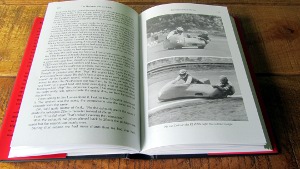
In the book he outlines the journey he made from a college certificate to early jobs as a motorcycle mechanic, that he initially had to blag his way into because of his lack of experience. His 'break' came in securing a job with Geoff Monty a Suzuki dealer who also had a showroom/workshop full of the racing bikes of the time: Manx Norton, G50 Matchless, and AJS 7R. There were also early Yamaha two stroke racers and Suzukis of course. With the atmosphere enhanced by racers of the day being in and out of the shop.
Two stroke tuning
Mention Stan Stephens to a motorcyclist who remembers this period, and they will immediately associate his name with two stroke tuning. Stan attributes the start of acquiring his knowledge to a Swedish racer called Bo Strandell, who had worked on experimental Porsche engine development. Bo explained all the technical merits of two stroke tuning: port timings, port shapes, compression ratios, squish bands and expansion chambers. And Stan, having absorbed all this knowledge like the sorcerers apprentice, was let loose on building the 250cc Suzuki 2 Stroke Clubman Racers that the dealership was selling - a new race bike for £660!
Once a racer always a racer
He bought his first racing sidecar outfit for £300 from George O'Dell who was a winning name at the time, and this began on/off sidecar racing stints down the years with various passengers who were obviously brave enough to step onto the platform so to speak. Once becoming a racer it's hard to stop, and this was the case with Stan Stephens. The book is full of racing anecdotes from his track days, and travels chronologically through his many business ventures, running from small tuning shops to full blown engineering workshops and dealerships, where he was subject to a number of audacious robberies.
Despite the numerous problems involved in trying to earn a living from the 'racing game', what shines through is an enthusiasm and determination to make it work. Surprisingly I found the sections where he describes the breakthroughs in making a particular machine perform competitively, clear and interesting. Surprising because I have little aptitude for this aspect of bike engineering.
Throughout the eighties he was the 'go to' man for work on the famed LC Yamahas. Stan Stephens bikes were rampant on the tracks, and always in the results. He had success in the nineties with four stroke Kawasaki machines, and into the new millennium with an R1 Yamaha for the British Superstock championship.
Out of all the little vignettes in the three hundred plus pages my favourite was the story of Leon, a youngster who started with work experience release sessions and then worked alongside Stan for years as his most reliable and eventually most knowledgeable team member before going to university and then on to work for one of the leading Formula One and Moto GP engine development companies.
For nurturing this young blokes talent I almost forgave him for the comment he made to woman in a race paddock in the eighties:
“Why don't you go home and get on with the washing up”.
'Matey' in style
The book was written and self published; but like many writers who take this route it could have used the services of a good editor. It's very 'matey' in style and reads like a cross between a diary and a raconteur going through his life story down the pub. In writing style it's a bit of a ramble in sections. He doesn't give much away in terms of his thoughts and feelings about the great social and political issues of our times. But I'd guess the the big issues for Stan were making the next phase of his business work, or solving the problems involved in getting a winning bike sorted.
If you're interested in the history of road racing over the last thirty odd years and the highs and lows of a single minded engineer/tuner and racer who always delivered the goods despite any adversity and a whole load of crashes that almost disabled him, then you'll enjoy this.
The book is a hardback and costs £16 plus £3.00 postage and packing from
www.stanstephens.com
He'll also make your classic two stroke go quickly!
